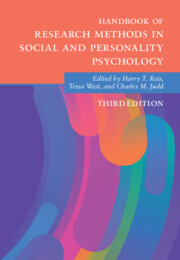Book contents
- Handbook of Research Methods in Social and Personality Psychology
- Cambridge Handbooks in Psychology
- Handbook of Research Methods in Social and Personality Psychology
- Copyright page
- Contents
- Figures
- Tables
- Contributors
- Introduction
- 1 The Romance of Research Methods
- Part I Before You Dive In
- Part II Basic Design Considerations to Know, No Matter What Your Research Is About
- Part III Deep Dives on Methods and Tools for Testing Your Question of Interest
- Part IV Understanding What Your Data Are Telling You About Psychological Processes
- 20 Measurement
- 21 Advanced Psychometrics
- 22 Dealing with Repeated Measures
- 23 The Design and Analysis of Data from Dyads and Groups
- 24 Random Factors and Research Generalization
- 25 Combining Statistical and Causal Mediation Analysis
- 26 Mathematical and Computational Models
- 27 Meta-analysis
- Index
- References
27 - Meta-analysis
from Part IV - Understanding What Your Data Are Telling You About Psychological Processes
Published online by Cambridge University Press: 12 December 2024
- Handbook of Research Methods in Social and Personality Psychology
- Cambridge Handbooks in Psychology
- Handbook of Research Methods in Social and Personality Psychology
- Copyright page
- Contents
- Figures
- Tables
- Contributors
- Introduction
- 1 The Romance of Research Methods
- Part I Before You Dive In
- Part II Basic Design Considerations to Know, No Matter What Your Research Is About
- Part III Deep Dives on Methods and Tools for Testing Your Question of Interest
- Part IV Understanding What Your Data Are Telling You About Psychological Processes
- 20 Measurement
- 21 Advanced Psychometrics
- 22 Dealing with Repeated Measures
- 23 The Design and Analysis of Data from Dyads and Groups
- 24 Random Factors and Research Generalization
- 25 Combining Statistical and Causal Mediation Analysis
- 26 Mathematical and Computational Models
- 27 Meta-analysis
- Index
- References
Summary
Meta-analysis is the quantitative analysis of results of a research literature. Typically, meta-analysis is paired with a systematic review that fully documents the search process, inclusion and exclusion criteria, and study characteristics. A key feature of meta-analysis is the calculation of effect sizes – metric-free indices of study outcome that allow the mathematical combination of effects across studies. The methodological literature on meta-analysis has grown rapidly in recent years, yielding an abundance of resources and sophisticated analytic techniques. These developments are improvements to the field but can also be overwhelming to new aspiring meta-analysts. This chapter therefore aims to demystify some of that complexity, offering conceptual explanations instead of mathematical formulas. We aim to help readers who have not conducted a meta-analysis before to get started, as well as to help those who simply want to be intelligent consumers of published meta-analyses.
- Type
- Chapter
- Information
- Publisher: Cambridge University PressPrint publication year: 2024

